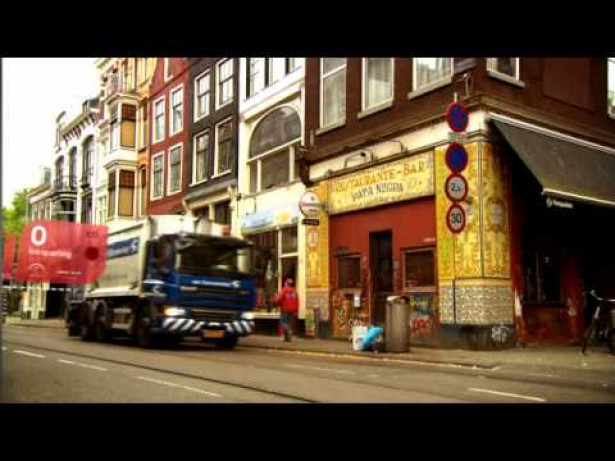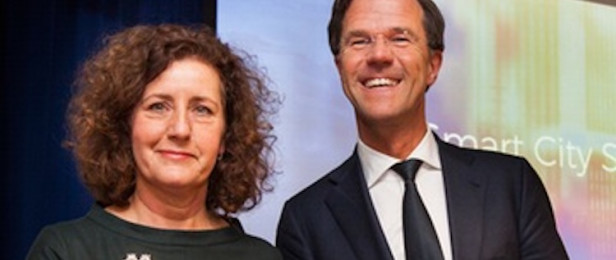A large number of Dutch cities, companies and scientists have contributed to the National Smart City Strategy. Earlier today, they presented their Strategy to Prime Minister Mark Rutte, who had requested a consolidated Smart City Vision. The G5 of the Netherlands' largest five cities (Amsterdam, Rotterdam, The Hague, Utrecht and Eindhoven) together with the G32 of middle to large size Dutch towns are keen to take a leading role and have asked central government in The Hague for support.
A large number of Dutch cities, companies and scientists have contributed to the National Smart City Strategy. Earlier today, they presented their Strategy to Prime Minister Mark Rutte, who had requested a consolidated Smart City Vision. The G5 of the Netherlands' largest five cities (Amsterdam, Rotterdam, The Hague, Utrecht and Eindhoven) together with the G32 of middle to large size Dutch towns are keen to take a leading role and have asked central government in The Hague for support. Please click here for the report.

The aim of the National Smart City Strategy is to improve the quality of life in Dutch cities and to introduce innovative solutions to increase their international competitive strength. As Dutch towns and cities are expanding and the pressure on public amenities and infrastructure is growing, it is vital to undertake action now. Around the world, cities are faced with issues such as urbanisation, climate change, employment, digitisation and mobility. The Dutch towns and cities agree that investments in smart technology are necessary to respond to these major social challenges and will provide a substantial contribution to their economic vitality.
The contributors to the National Smart City Strategy perceive a great need for high-end digital infrastructure and room to experiment, to allow them to develop their pilot programmes into large-scale projects across a range of different areas, including mobility and accessibility of cities, sustainable and low-energy homes and building, improvements of air quality and smart, healthy urbanisation. These initiatives will require the set-up of cross-sector partnerships and active participation from both residents and businesses, focusing on cybersecurity, privacy, interoperability, hyperconnectivity, open source digital infrastructure, standardisation and finance.
The Hague's Deputy Mayor Ingrid van Engelshoven, Portfolio Holder for Knowledge Economy, International Relations, Education and Youth said: 'The joint Smart City Strategy is a key requirement to be able to move ahead. The cities will build on their own strength and the need to draw up joint investment agendas. Cities and towns, businesses, research institutes and Central Government will have to work together to contribute to the economic growth, prosperity and quality of life of our cities, benefiting residents, visitors and businesses alike.'
NXP's Maurice Geraets: 'The National Smart City Strategy offers real solutions to real problems, which can be applied not only in the Netherlands but worldwide. Dennis Mica, 2getthere: 'Together cities are stronger. The Smart City Strategy offers an effective platform to organise partnerships and address the challenges of our times.'
Cities facilitate innovation
The associated cities facilitate experiments to develop innovations and urban applications in living labs, providing solutions which can be replicated by other cities. Working on a larger scale will also provide better business cases and a more attractive investment climate. It is important that projects are guided by the specific qualities of each city and that the cities are prepared to work with other cities as well as with governments, businesses and knowledge institutes.
International positioning
The associated cities aim to step up their international collaborations as well, encouraged by the Smart City World Expo in Barcelona in November 2016 and supported by the Global Smart City & Community Coalition. These global initiatives work in line with the United Nations' Sustainable Development Goals, which also reflect the main principles of the national strategy.
Joint Cities and Central Government investment strategy
It is important for Central Government to recognise Smart Cities as an economic cornerstone with a global impact. Central Government will need to make an active contribution to draw up a joint investment agenda. The associated cities would also like to call on the Dutch Government to facilitate quick decision-making and legal room for experiments.
Smart Cities requires co-ordination
Together, the public and private parties as well as the academic institutes propose that the different ministerial departments co-ordinate their actions to support the cities' Smart City development. It is essential that they share knowledge, co-ordinate national initiatives and contribute to the alignment of the various requirements. In effect, city councils, businesses and knowledge institutes are already linked up through regional platforms, but a well co-ordinated and focused national effort can help to share knowledge, obtain best practices in Smart City solutions, promote smoother collaboration and provide welcome support for the organisation's international activities. This includes providing support for cities, businesses and knowledge institutes to receive national and European subsidies.
------------------------------------------------------------------------------------------------------------------------------------------------------
Note to the editor(s):
The National Smart City Strategy will be presented to Prime Minister Mark Rutte by Ingrid van Engelshoven (The Hague Deputy Mayor), Jack Mikkers (Mayor of Veldhoven, board member of Brainport Eindhoven), Peter Molengraaf (Alliander), Bram Reinders (GSC3) and Maurice Geraets (NXP).
The G5's responsible portfolio holders are:
The Hague: Ingrid van Engelshoven (D66 - Knowledge Economy, International Relations, Education, Youth); Amsterdam: Kajsa Ollongren (D66 – Economy); Utrecht: Jeroen Kreijkamp (D66 - International Relations, Economy, Education); Rotterdam: Maarten Struijvenberg (Economy and Employment), representing Rotterdam was Pex Langenberg (D66 - Mobility, Sustainability and Culture); Eindhoven: Staf Depla (PvdA - Economy, Brainport, Vocational and Professional Education).
Representing the G32 City Network were: Menno Tigelaar (CU Amersfoort - ICT) and Erik de Ridder (CDA Tilburg, - Economy and International Acquisitions, G32 Smart Cities).
For more information, please email press@awarenessengineers.com or contact Deputy Mayor Ingrid van Engelshoven's spokesperson Louis Hueber on +31 6 55740059.





